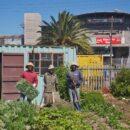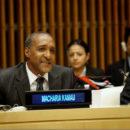Europe pushes away migrant ‘problem’ but many more will still come – By Ismail Einashe and Giulia Liberatore

Ugaas, from Somalia, in front of the ‘Salem Palace’, a migrant squat in the outskirts of Rome (Photo by Kate Stanworth).
In the space of one weekend in April over 800 migrants perished in the waters of the Mediterranean. This was the worst death toll since a ship carrying migrants sank off the coast of the Italian island of Lampedusa on 3rd October 2013, killing at least 366 people. In 2014 some 200,000 migrants crossed the Mediterranean by boat from North Africa and approximately 3,500 died attempting the journey. So far this year 1,700 have perished.
At the centre of this crisis in Europe is Italy, which has become Europe’s migrant bottleneck. Some 170,000 out of 200,000 migrants arrived there last year. Last Thursday, Italian Prime Minister Matteo Renzi organised an emergency EU summit to discuss the crisis. Over the last year Italy ceased its Mare Nostrum search and rescue operations because of EU budget constraints. Since replacing it with the Frontex-run (the EU’s border agency) “˜Operation Triton’, the number of deaths has soared.
The Mediterranean is now the most dangerous sea crossing for migrants in the world. So far this year 86% of those who have died have come from Sub-Saharan Africa. Many are from the Horn of Africa (principally Eritrea, Ethiopia and Somalia) and they are fleeing dictatorial regimes, wars, civil unrest and poverty.
Italy was once the colonial power in Eritrea and Somalia, and it occupied Ethiopia “”a fact that is rarely acknowledged in Italian public debate””and their histories intertwined long before migrant arrivals on Italian shores. Many migrants transit through Libya, also a former colony, now mired in civil war.
Take Ahmed, a young man we met near Rome’s Termini railway station, he arrived from Somaliland in 2008, and was fortunate enough to have come at the right time, when numbers of those crossing were smaller, and the route less perilous. He left the city of Berbera with two men, and his childhood friend Hodan. In taking off for tahrib (as Somalis call the migrant journey) he did not warn his mother, as many young men often do to minimise the pain. He travelled across Ethiopia, Sudan and Libya. One of his friends fell ill along the Ethiopia-Sudan border and he was forced to leave him behind. Ahmed looked down and shook his head ashamed when we asked him if he had heard from him since. He says the crossing took over 35 hours, he recalls hundreds squashed into a small boat for the cost of several hundred dollars.
On arrival, unlike many young men who reach Italy today, he was granted refugee status within a few months. But his journey did not end there. He was soon confronted with a crumbling infrastructure, dwindling resources and barely any support networks for refugees. Although all refugees are entitled to 6 months of free accommodation, only the lucky or savvy ones, who are able to navigate the system, actually get it. These conditions push many like him to move north towards Scandinavia, the UK or Germany.
Ahmed says that “no one wants to stay and have a life in Italy,” but because of the Dublin Regulation””whereby the state through which the asylum seeker first entered the EU is held responsible for examining the claim to asylum – they are often sent back there. He initially spent time drifting between Termini station in search of an odd job for the day, Salaam Palace (the infamous migrant squat in the outskirts of Rome), and emergency night shelters in the city. After another failed attempt to leave Italy for northern Europe, he finally found a job distributing leaflets and has begun to settle down and to plan for the future. When we met he had just started a stable job as a window cleaner and had recently married Hodan, his childhood friend with whom he shared what were perhaps the hardest months of his life.
For more recent arrivals like Ugaas, a 21 year old from Somalia, the situation is much more difficult. He left his home in Somalia in April 2013, and trekked on foot across Ethiopia and Sudan to Libya. Though he had a good job back home as a market trader – he earned $50 a month and he was able to support his family – he told us he wanted to better himself and he had heard good stories about Europe. He knew very little about life in Europe except that he had a sister in Norway who had arrived there in 2004 and has since been granted refugee status. He had planned to make the journey across Africa into Europe and to join his sister in Oslo.
Ugaas arrived in Libya in July 2013 after an ordeal in the desert. He was smuggled by Libyans who used pick up trucks to transport migrants, squeezing 26-30 people into each vehicle. He says he had no water to drink or food and that three people died of thirst or hunger, their bodies simply thrown into the desert. The smugglers demanded more and more money and he was beaten up and tortured when his family could not pay on time. At one point they tied his hands behind his back and threw stones at his head. The scars are still visible today.
Ugaas was eventually released by the people smugglers and made his way to the Libyan coast. From there he boarded an inflatable boat with 75 others and they spent three nights at sea before being rescued by the Italian coastguard. He landed in Syracuse in Sicily and then made his way to Rome, where he now lives in a building squatted by migrants on the outskirts of the city.
The entire journey he says, “cost my family $6,000″ making them significantly worse off as they had to sell their plot of land to pay for his passage. In May 2014 he tried to make it to Norway on a forged passport, flying from Rome to Oslo. But he was fingerprinted and, as he put it, they “found out my true identity”. He applied for asylum in Norway and waited 8 months before his application was refused and he was sent back to Rome. He now says “I thought I would have an education, a job, I was shocked at how hard life is in Europe.” Now, like many other young migrants, he is stuck waiting for the Italian authorities to give him residence status. Ugaas says that he “won’t stay [in Italy], I’m praying I’ll leave soon”.
Despite the difficulties, and what is often a life lived in limbo waiting for a job, or an opportunity to move elsewhere, some African migrants opt to remain. Many are now fighting for the rights of migrants, such as Nobel Peace Prize nominee Tareke Brhane, from Eritrea, now based in Rome. Brhane is the Director of “˜Comitato 3 Ottobre’, an organisation that he set up in 2013 after the Lampedusa shipwreck. He arrived in 2005 from Tesene, a border town in Eritrea, escaping indefinite forced national conscription. “I was lucky”, he explains, “if someone stops you (at the border crossing between Sudan and Eritrea) you’re not just arrested, but killed. If you go away you’re considered a traitor”. He tried to cross the Mediterranean twice, the first time he spent five days at sea with no food or water and was refused entry and deported by the Maltese authorities.
His journey to Italy involved spending 8 months in several Libyan prisons, including the infamous Kufra prison, where prisoners slept huddled on top of each other with no facilities and very little food. In October 2005 he landed in Syracuse “I was tired and it was cold, it was December,” he remembers. Eventually he made his way up to Rome and was part of the group of Eritreans who first occupied Salem Palace, where Ahmed also spent some of his early days in Italy. “The date I arrived is inscribed on the walls in the place,” he told us.
But life in Salem was a struggle, and Brhane decided to return to Agrigento in Sicily. It was then that he learnt Italian and started working as a translator and eventually in Lampedusa as a rescue worker. As the director of the Comitato he has been successful in pushing a law in Italy that recognises the 3rd October as a national day of remembrance. He has also worked to raise awareness about the plight of migrants arriving from Africa and the struggles faced by those who choose to make their lives in Italy.
Following this month’s deaths, the Comitato launched a petition calling for a search and rescue mission to resume off the Italian coast. But thus far his plea has fallen on deaf ears. Last week’s EU meeting has not pushed European leaders to alter their approach. Identifying new enemies and criminalising their activities is naively seen as the quick fix solution. This time it’s war on the smugglers, who Matteo Renzi has called “slave traders of the 21st Century”.
Europe continues to respond by militarising its borders, and persevering with a policy that lets migrants die as a way of deterring others from coming. While funds for Operation Triton have been tripled, there has been a general reluctance to view the problem as a humanitarian one that requires not only a search and rescue mission, but also willingness on the part of European states to welcome and resettle refugees. The UK’s response””donating military equipment but making no commitment to take on any refugees””exemplifies Europe’s attitude of pushing away the problem with force and refusing to take responsibility for human lives.
Ismail Einashe is a journalist and researcher based in London. Giulia Liberatore is an anthropologist at the University of Oxford. Some names have been changed to protect identities of interviewees






Europe helped set up an”international order” that it and other world powers to follow while those powers continue to systematically undermine the same system. Rich countries have been up in arms about Kenya’s demands to close refugee camps due to insecurity issues, but the same powers have no problem letting asylum seekers(for this is what they are) drown in their thousands right within their waters, not to mention the national laws that make it virtually impossible to obtain refugee protection, the asylum detentions(and the attendant abuses) etc. Either we have international laws to which everybody adheres or we don’t. While a basic sense of humanity might be too much to ask our European friends, surely they can show some regard for the international laws they helped create? Or are there exceptions to the international law of the sea and international humanitarian laws where African asylum claimants are concerned?
It’s a desperate situation. The only long term solution for those coming from Africa has got to be investment in economic growth and the provision of employment in those countries from which migrants are leaving. We are engaged in supporting entrepreneurs and business and technical training in The Gambia in an attempt to “make a difference”. And not a mention of international development by any of the main political parties!
Why you blame Europeans, only nations doing some good for migrants?. Remember: you are responsible for yourself. Not “international law” nor Europeans. Just please do not throw yourself into the sea! If you’ll drown it would be only your fault. Take a flight to Europe like a normal person. It is much cheaper that $6000 paid to smugglers.